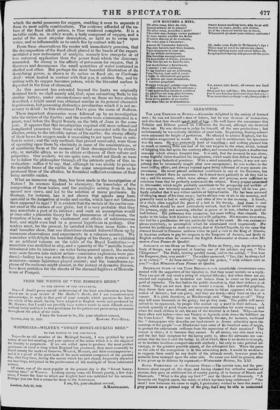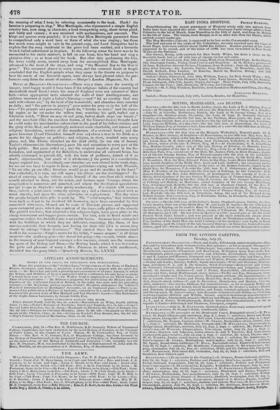GLEANINGS.
Tits ars EMPEROR OF Russis.—Alexander delighted in the society of learned men : he was not himself a man of letters, but he was desirous of instruction, and also that they should ak well of hjea. t Ile well knew the encomiums that Voltaire and Diderot passe OD Catharine the Second, although she deserved them not. He was desirous to judge for himself, all the new productions • but unfortunately he was entirely destitute of good taste. In painting, flaming colours were esteemed the height of perfection. He affected to admire Raphael, but his admiratien evaporated in words. In sculpture and in architecture his ignorance was the same. He was e2itremcly fond of trueRing ; and nothing pleased him so much as running-Min Mirend of his vast empire to the other, which, instead of fatiguing him, had quite the contrary effect, and seemed to dissipate a douleureux souvatit.- which always haunted him. It is said, that the moment he was alone, some frightful vision troubled his imagination, which made him deliver himself up to vet* Many fantastical practices. With a mind naturally active, it was not sur- prising that he incessantly sought after new occupations; he was restless in the most trifling affairs, and always insisted upon being informed of every minute cir- cumstance; He never placed unlimited confidence in any of his Ministers, but he never refused them an audience : he listened most patiently to all they had to. say; anil his answers, which were always clear and precise, were sufficient to convince them that he perfectly understood the subject. Every project. submitted to Alexander, which might probably contribute to the prosperity Mil *Atte or his empire, Was minutely examined b.4ii. „anti never rejected till he was per.. fectly. satisfied that it was either-useless or Inipractrcalde. He has been accused sleeping much of his time away; but he always rose at six in the morning, and generally vein to bed at midnight, and often at two in the morning. A bench,, or a chair, often supplied the place of a- bed in his trav4 thew is -one thing, which should be most particularly noticed, that he never omitted saying-, his prayers,. night and morning, whether at peace or, in war, whether in good or bad fortune. :His :politeness was excessive, but more trifling than elegant. He spoke to the ladies with kindness, but not with gallantry. His mamiers were even-, nor had he a predilection for any particular lady of his court. He was anxious to. please everybody, to accomplish which be entertained most expensively. Hat• carried his politeness to such an extent, that at Aix-la-Chapelle, he the saine'daay dressed himself inPrussian uniform when he paid a visit to the King of Piussiai in Austrian uniform to pay his respects to the Emperor of Austria, and lastly in English uniferm when he received the English Ambassador at dinner.--Les moires (rune Femme de Qualite.
ANECDOTE OF THE DUKE DE BEanv.—The Duke de Berry, one day reviewing a body of troops, was surprised at hearing cue of the soldiers cry out, t- Vive l'Empereur." The Duke, turning quickly round,'said to the soldier' "'You love the Emperor, then, very much ? " The soldier answered, "Yes, Sir; he always led us to victory." " Le beau merite," replied the prince, " with: soldiers such as you!"—Les ilfemoires crime Femme de Qualite.
DESPERATE STATE OF THE CORN Mosansii.v.—A remarkahle circumstance con- nected with the supporters of the injustice is, that they never venture on a reply.. They can put off and vend a string of original fallacies; hut when these are an, swered and exploded, no invitation can induce them to enter on the pain and peril of rejoinder. The fact before the public therefore is, that their defence is at: a stand. They are not men that can render a reason! Like unskilful pugilists,, they throw their arms abroad, and may chance to bitan opponent who has no. notion of defence; but one parry, and they are down,--they have no idea of a, riposte. It is plain therefore, as Marlborough said, "they must go off." They- may kill some thousands in the going; but go they mutt. The public will never submit to be oppressed, by people who cannot say a Word in their defence. As certain quantity of good tropes are necessary ammunition for every wrong ; and when the stock of these is out, the end of the mischief is at hand. Why—as has, been often said before—does not Vindex or Agricola Write down the babblers gm the Corn Laws ? Why does not the Quarterly Review, for instance, conic's:tea the " demagogues who describe our landowners as drones subsisting upon tle earnings of the people"—or Blackwood turn some of Isis hundred arms of migfit, to protect the unfortunate sufferers from the aspersion 0 of their enemies ? The reason is clear; it is because they cannot. In all causes, one side must win; and the last fatal symptom for the losing party is ssfbeit his advocates are COB- scions that the less is said the better. In all of which, there is no desire to triumph, or to institute invidious comparisOns with anybody ; but only to take political ad- vantage, to the greatest possible eittent, of the substantial fact. When the press on the side of the monopolists is iÜ this unresisting State, it would be weakness to suppose there could be any doubt of the ultimate result, however great the material force arranged upon the other side. No cause can hold its greund, after it has given up its defence by argurnent.—Westminstfr Review, No. XXI.
ROYAL FOREIGNERS AT AN ENGLISH OPERA —Tip curtain rose, and the per. formers stood ranged on the stage, and having chaated the orthodox number of stanzas, they gave an additional list of namby pamby, all in honour of Hearts and Diamonds. " What is the play my lord ?' said the Queen of Diamonds. "A favourite old English opera, the music of which has been long celebrated." "
deed how fortunate we came to night, I particulary wished to hear this music :
pray procure me a printed copy of the play, that I may be able to .understaid the meaning of what I hear, by referring occasionally to the book. Hush! the heroine is preparing to sing." Miss Martingale, who represented a simple English country lass, now sang, in character, a loud trumpetting song, about tartan plaid, and battle and victory ; it was received with acclamations, and encored. The kings and queens were puzzled ; it is true that Miss Martingale permitted them to comprehend only a word here or there of what she was singing; but those few words were sought in vain in the printed copy, and Lord Shropshire had to explain that the song incidental to the piece had been omitted, and a favourite Scotch ballad substituted in its place. In the following scene the lover was to be reconciled to his rustic mistress, to fall on one knee, kiss her hand and sing a plaintive ditty ; so at least said the book. But after duly performing the kiss, the lover coolly arose, turned away from the accomplished Miss Martingale, advanced to the front of the stage, and sang "the Minstrel Boy to the War is gone." This occurred almost in every scene, and the crowned heads at length concluded that the English people when they came to the theatre on purpose to hear the music of one favourite opera, were always best pleased when the per- formers sang them the music of another.—Sharpe's London Magazine, No. I.
DECAY OF RELIGIOUS OBSERVANCES.—There was a time, since the worship of images. rand happy would it have been if the religious habits of the country had thenceforth stood fixed,) when the men of England were not ashamed of their faith—when appropriate texts adorned the walls of their dwelling-rooms, and children received at night a father's blessing ;—and" let us worship God was said with solemn air," by the head of the household; and churches were resorted to daily ; and "tire parson in journey" gave notice for prayers in the hall of the inn—" for prayers and provender," quoth he, " hinder no man ;" and the cheer- ful angler, as he sat under the willow tree, watching his quill, trolled out a Christian catch, " Here we may sit and pray, before death stops our breath ;" and the merchant (like the excellent Sutton, of the Charter-house) thought how Ire could make his merchandise subservient to the good or his fellow-citizens and the glory of his God, and accordingly endowed some charitable, and learned, and religious foundation, worthy of the munificence of a crowned head ; and the grave historian (Lord Clarendon himself does so) chose a text in his Bible as a motto for his chapter on politics ; and religion, in short, reached unto every place, and, like Elisha stretched on the dead child, (to use one of Jeremy Taylor's characteristic illustrations,) gave life and animation to every part of the body politic. But years rolled on ; and the original impulse given at the Re- formation, and augmented at the Rebellion, to undervalue all outward forms, has silently continued to prevail, till, with the form of godliness, (much of it no doubt, objectionable, hut much of it wholesome,) the power in a considerable degree expired too. Accordingly, our churches are now closed in the week-days, for we are too busy to repair to them ; our politicians crying out with Pharaoh, " Ye are idle, ye are idle; therefore would ye go and do sacrifice to the Lord." Our cathedrals, it is true, are still open ; but where are the worshippers? In- stead of entering in, the citizen avails himself of the excellent clock winch is usually attached to them, sets his watch, and hastens upon 'Change, where the congregation is numerous and punctual, and where the theological speculations are apt to run in Shylock's vein pretty exclusively. If a church will answer, then, inbred, a joint-stock company springs up ; and a church is raised with as much alacrity, and upon the same principles, as a play-house. The day when the people brought their gifts is gone by. The " solid temples," that heretofore were built as if not to be dissolved till doomsday, have been succeeded by thin emaciated structures, bloated out by coats of flatulent plaster, and supported upon cast-metal pegs, which the courtesy of the tittles calls pillars of the church. The painted windows, that whuitted a dint religious light, have given place to the cheap house-pane and dapper green curtain. Tire font, with its florid reliefs anti capacious crater, has dwindled into a miserable basin. Sermons have contracted with the buildings in which they are delivered, consisting, like them, of less massive materials than formerly, and having for their title (if it is meant they should he taking) "short discourses." The clerical dress has accommodated itself to the sermons—Virgirs motto for Iris heifer, "oinnia magna," in all thingt reversed—the skull-cap gone—the shovel-hat going—the cassock, which ahnos- in the memory of man lingered amongst a few ancients, shrunk into the untneans lug apron of the Bishop and Dean,—the flowing bands, which it was heretofore the pride and pleasure of many a Mrs. Primrose to adorn with needlework, dwindled itito two puny labels.—Quarterly Review, No. LXXXI.



















 Previous page
Previous page